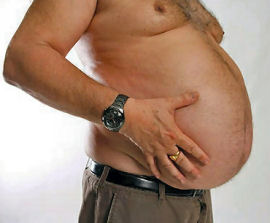 For testosterone-deficient men, major long-term weight loss was found to be a significant beneficial side effect of testosterone replacement therapy. The new study findings were presented last week at The Endocrine Society's 94th Annual Meeting in Houston. "The substantial weight loss found in our study - an average of 36 pounds - was a surprise," said the study's lead author, Farid Saad, of Bayer Pharma.
For testosterone-deficient men, major long-term weight loss was found to be a significant beneficial side effect of testosterone replacement therapy. The new study findings were presented last week at The Endocrine Society's 94th Annual Meeting in Houston. "The substantial weight loss found in our study - an average of 36 pounds - was a surprise," said the study's lead author, Farid Saad, of Bayer Pharma. For the study, the researchers restored testosterone to normal levels in 255 testosterone-deficient men, whose average age was 61. The treatment lasted for up to five years, with injections given at day 1, after 6 weeks and then every 12 weeks after that. The patients did not follow a controlled diet or standard exercise program.
The researchers used a slow-release, injectable form of the hormone (testosterone undecanoate) that is not yet available in the United States. It is marketed in Europe, Latin America, Australia and parts of Asia and Africa.
On average, the men weighed 236 pounds before beginning testosterone treatment and 200 pounds after treatment. Saad added that the weight loss was continuous, with an average reduction in body weight ranging from about 4 percent after one year of treatment to more than 13 percent after five years. Additionally, men lost an average of nearly 3.5 inches around their waist.
Although prior studies into testosterone therapy showed changes in body composition, such as increased lean mass and decreased fat mass, the net effect on weight seemed unchanged in those studies. However, Saad said his study, which took place in Germany, had a longer follow-up and used long-acting injections of testosterone.
Testosterone deficiency becomes more common with age and Saad said that there is "a vicious circle" in obesity and low testosterone. "Obesity is associated with reduced testosterone, and low testosterone induces weight gain," he explained.
Meanwhile, at the same conference, Australian researchers reported that testosterone levels appear to decrease about 1 percent each year. Their research involved more than 1,300 men aged from 35 to 80 years, with an average age of 54. Interestingly, the researchers found that certain lifestyle factors were linked to lower testosterone levels.
"Men who had declines in testosterone were more likely to be those who became obese, had stopped smoking or were depressed," said study co-author Gary Wittert, professor of medicine at the University of Adelaide.
Past research has linked depression and low testosterone and Wittert said that unmarried men in the study had greater testosterone reductions than did married men. He attributed this finding to past research showing that married men tend to be healthier and happier than unmarried men. "Also, regular sexual activity tends to increase testosterone," he explained.
Related:
Discuss this article in our forum
Men With Alzheimer's Show Benefits From Testosterone Therapy
Sugar causes testosterone to plummet
More evidence linking testosterone and muscle in old age
Source: The Endocrine Society

